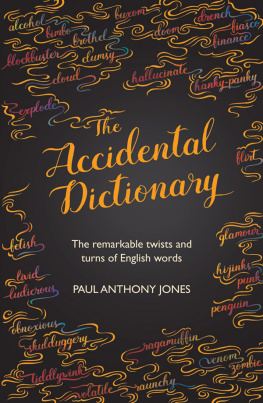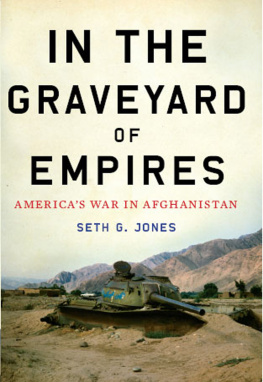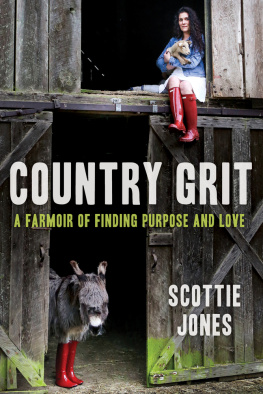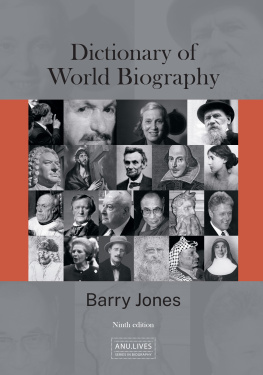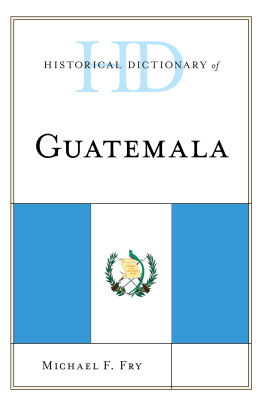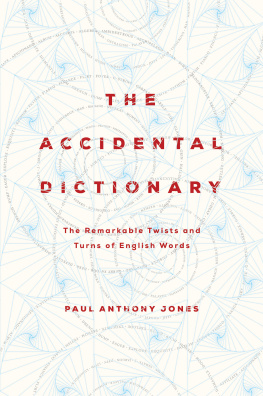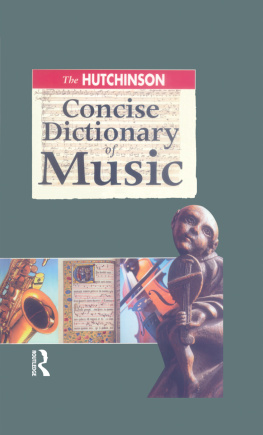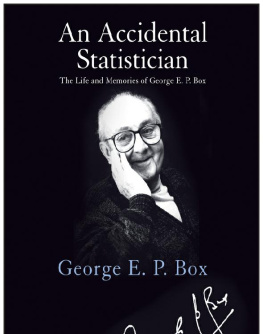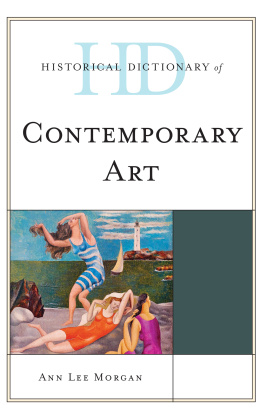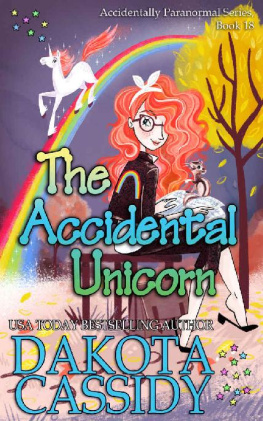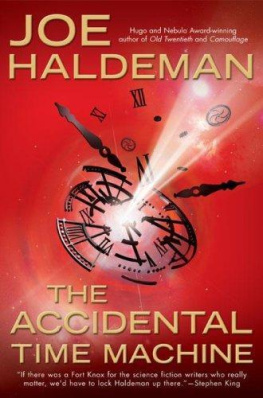Jones - The Accidental Dictionary
Here you can read online Jones - The Accidental Dictionary full text of the book (entire story) in english for free. Download pdf and epub, get meaning, cover and reviews about this ebook. year: 2016, publisher: Elliott & Thompson, genre: Religion. Description of the work, (preface) as well as reviews are available. Best literature library LitArk.com created for fans of good reading and offers a wide selection of genres:
Romance novel
Science fiction
Adventure
Detective
Science
History
Home and family
Prose
Art
Politics
Computer
Non-fiction
Religion
Business
Children
Humor
Choose a favorite category and find really read worthwhile books. Enjoy immersion in the world of imagination, feel the emotions of the characters or learn something new for yourself, make an fascinating discovery.
- Book:The Accidental Dictionary
- Author:
- Publisher:Elliott & Thompson
- Genre:
- Year:2016
- Rating:5 / 5
- Favourites:Add to favourites
- Your mark:
- 100
- 1
- 2
- 3
- 4
- 5
The Accidental Dictionary: summary, description and annotation
We offer to read an annotation, description, summary or preface (depends on what the author of the book "The Accidental Dictionary" wrote himself). If you haven't found the necessary information about the book — write in the comments, we will try to find it.
Jones: author's other books
Who wrote The Accidental Dictionary? Find out the surname, the name of the author of the book and a list of all author's works by series.
The Accidental Dictionary — read online for free the complete book (whole text) full work
Below is the text of the book, divided by pages. System saving the place of the last page read, allows you to conveniently read the book "The Accidental Dictionary" online for free, without having to search again every time where you left off. Put a bookmark, and you can go to the page where you finished reading at any time.
Font size:
Interval:
Bookmark:


For Nick, Chris and Gav
O ne of the enduringly great things about language is that it is in a continuous state of change. The words we use every day are relentlessly evolving and shape-shifting, broadening and specialising, adjusting and reworking themselves from one decade to the next.
At times, these changes can seem fairly predictable. Take a word like computer, for instance. Derived from the verb compute (which in turn has its roots in a Latin word meaning to reckon), when it first emerged in the early 1600s it referred, quite literally, to someone employed in performing computations and calculations. But as technology progressed, so too did the word. By the turn of the nineteenth century a computer was a mechanical device used to perform or assist in performing complex calculations, and from there the first reference to an electronic computer emerged in 1946.
Not all etymological stories are quite so straightforward, however. Delving into the histories of the words we know and use every day can often reveal some fairly peculiar developments, as the routes they take through the language are not always so smooth and uneventful. Instead words are knocked and buffeted, subjected to twists and turns, expansions and contractions, happy and unhappy accidents, at the end of which they can find themselves far removed from their starting points.
Take the word accident itself. It derives from a Latin root meaning to fall, and so when it first appeared in the language in the fourteenth century referred merely to any event or occurrence. Put another way, an accident was originally an incident. Within a hundred years or so, however, that sense had narrowed so that an accident was now a chance event, either good or bad, that had occurred unexpectedly or unintentionally, or without prior knowledge or interference. And finally from there and perhaps because bad luck always seems to make more of a talking point than good luck that meaning narrowed again, so that by the late 1500s accident had become a byword for a specifically unfortunate event or a mishap, the sense in which it finds itself chiefly in use today. All in all, accident has been on quite the accidental journey and its by no means alone.
Cast an etymological eye over the other words in your vocabulary and you soon see even more unanticipated tales emerge. Girls, you discover, could once be boys. Your nephew was originally your grandson. The queen was your wife. A shampoo was a massage. Clouds were rocks. Noon was 3pm. Once upon a time, you could eat potpourri. You could paint with pencils, get drenched in a tiddlywink, fall for a hat-trick, and end the night looking utterly raunchy. Under scrutiny, the dictionary reveals an unpredictable network of etymological crossed paths, U-turns and forks-in-the-road like these, mapped out as its words dart from one meaning to another over centuries of development. It becomes an accidental dictionary.
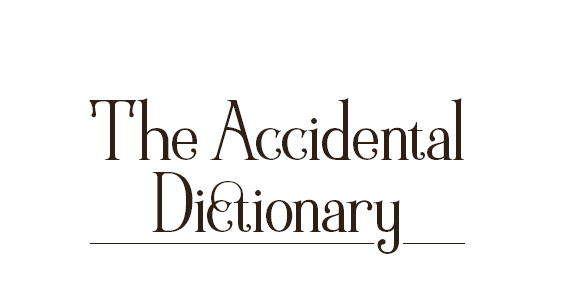
Affiliate is a word whose etymological journey has taken it from rather humble and straightforward beginnings in the early 1600s, through to the ultra-modern worlds of e-commerce and online marketing. A typical twenty-first-century glossary of business-speak or internet jargon full of the kinds of words that once you learn their meaning, you really wish you hadnt will include entries for affiliate networks, affiliate trackers and affiliate aggregators. Websites will send you affiliate links. Internet marketing aficionados (more on those in a moment) will talk of affiliate cloaking. Online companies will sign affiliation agreements. Its all absolutely riveting.
That hasnt always been the case of course the word affiliate is four centuries old, after all. But even in these jar-gonish contemporary applications, the words basic meaning survives: as a verb, affiliate means to connect, to join or to cooperate with, while as a noun its a synonym of words such as associate, colleague and partner. Either way, its clearly concerned with association and incorporation, partnership and community. Keeping things in a family, you could say which is, in fact, precisely what it once meant.
At the centre of the word affiliate is the Latin word for son, filius, an etymological root that it shares with the likes of filial and filicide, as well as a host of superbly obscure words such as filionymic (a name derived from that of your son) and filiopietism (excessive veneration of your ancestors). When it first appeared in the language in the early seventeenth century, affiliate meant to adopt a child or, as the English lexicographer Henry Cockeram defined it in his brilliantly titled English Dictionarie, or an Interpreter of Hard English Words (1623), to choose one for his son.
This original meaning steadily developed so that by the mid 1700s affiliate had come to be used to mean to ascertain the parenthood of a child making affiliation essentially eighteenth-century legalese for a paternity test. As one London newspaper reported in 1798, an appropriately named Mr Law had recently appeared in court with an affidavit which stated that Mary Walker came to him in order to affiliate a bastard child, while an 1842 digest of legal cases on the Isle of Man declared that:
By the common law of the Isle of Man... a widow is entitled to dower only dum sola et casta vixerit[as long as she stays unmarried and chaste], and was held to have forfeited it by the birth and affiliation of a bastard child.
Blimey, they really didnt mince their words back then.
Although uncommon, this legal use of affiliate still survives today, but it is the broader, more generalised use of affiliate to mean merely to connect to or to become associated with a figurative development that first emerged in the mid 1700s that has since established itself the words most familiar meaning.
If all that talk of affiliate aggregators and affiliation agreements leaves you clueless, you could always turn to an online aficionado to help you out. Thats because an aficionado is an expert, right? A connoisseur. A die-hard follower. Someone who knows so much about a certain subject that theyre the go-to authority on it. Well, that might be the case today, but originally things were quite different.
Take this line from a letter written in 1797 by a German travel writer named Frederick Augustus Fischer, after he had attended a bullfight in Bilbao, Spain:
At each end of the square an amphitheatre was erected, and the whole enclosed with palisades. The benches and balconies on either side bent under the weight of the spectators... the square itself was a crowd of aficionados or amateurs, who came there to be active in striking the bulls, but so as to escape in case of need by leaping over the palisades.
Next pageFont size:
Interval:
Bookmark:
Similar books «The Accidental Dictionary»
Look at similar books to The Accidental Dictionary. We have selected literature similar in name and meaning in the hope of providing readers with more options to find new, interesting, not yet read works.
Discussion, reviews of the book The Accidental Dictionary and just readers' own opinions. Leave your comments, write what you think about the work, its meaning or the main characters. Specify what exactly you liked and what you didn't like, and why you think so.

